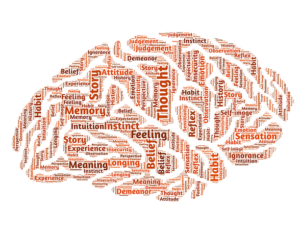What is the role of Neuroscience in our Everyday Life?
The Role of Neuroscience in Everyday Life
Have you ever thought about how our everyday life affects our brain function? Or how are our activities are related to the chemistry of our brains? What is the role of neuroscience in our lives?
I am sure you have, at least once, heard about dopamine secretion when you eat a piece of chocolate; or about the “love” hormone, oxytocin; or the endorphins that are flooding your brain when you exercise. And the list goes on and on.
The above are all true. Everything we experience in our life affects one or more specific pathways in our neural system. It causes the secretion of a unique cocktail of chemical compounds which affects first our brains in a specific and unique way, and then our bodies.
So, this is the first article of the blog. My goal is to introduce you to the chemical world of our brains. In this context, you will read some basic information about the main chemical compounds of our nervous systems, which will bring us into contact with neurochemistry. Eventually, we will get an idea of the role of neuroscience in our everyday lives!
Let’s Roll!
The nervous system not only controls the physical functions of our body but also the psychological. It even controls the functioning of the organs of the human body.1 For this, different neurotransmitters regulate the necessary functions, which include:
- Concentration and focus
- Heart rate and breathing
- Sleep cycles and digestion
- Mood and appetite
- Muscle movement and locomotion (movement from one location to another).
Neurotransmitters are endogenous chemicals that permit neurotransmission, communicating information throughout our brain and body. Therefore, they act as a relay for different messages when they travel between the receptors of different target cells. Different neurotransmitters play either inhibitory or excitatory functions in response to specific stimuli.2
Neurotransmitter levels can be put out of balance in many ways which can cause various unfavorable symptoms. For instance, stress, a “bad” diet, genetic predisposition, both prescription and recreational drugs, alcohol, caffeine intake, and many more factors can push these levels out of optimal range.2
We will discuss all of them and more in future posts. However, for now, we have to meet the main chemical messengers of our neural system.
Dopamine
Dopamine is a significant neurotransmitter for more functions than we can list. Some of these include movement coordination, rewarding experiences, behavior, learning, memory, sleep regulation, attention, and motivation. It is critical for different muscle movements and a deficiency of dopamine can be responsible for Parkinson’s disease, among others disorders.1,3
You can experience a high amount of dopamine every day during excitatory and pleasurable activities. Your brain produces dopamine when you eat that little piece of chocolate, when you receive a message on Facebook, when your picture on Instagram gets lots of likes, and when you watch those videos online.
However, dopamine is not only a molecule of pleasure but also a “molecule of more”. You don’t just enjoy that little piece of chocolate; you want more! In other words, we produce a little dopamine when we achieve a goal and so we want more.
We produce a little dopamine with a like or a text message on Insta, and so we want more. We produce a little dopamine by watching those videos online, and so, guess what? We want more!!
Whole industries are based on this function of dopamine, which is something we are going to discuss thoroughly in the future.

Epinephrine – Norepinephrine
Epinephrine or adrenaline and norepinephrine have significant functions in the bodily fight or flight response. Whenever a person is in a stressful condition, their body releases epinephrine in response to stress.2
Epinephrine is vital in increasing heart and respiratory rates, while norepinephrine has more of an effect on our blood vessels. When under chronic stress, the body’s epinephrine concentration can exceed exceptional levels. This could lead to heart disease, diabetes, and hypertension.2,3
Epinephrine also plays a role by giving muscles jolts of energy, while low levels of norepinephrine are associated with decreased focus ability, low energy, and sleep cycle problems.2
You will notice higher levels of those chemical compounds after a warm cup of coffee since several studies have demonstrated the effect of caffeine on the excretion of both urinary epinephrine and norepinephrine have been shown to increase after caffeine administration.4
GABA (Gamma-Aminobutyric Acid)
GABA is an amino acid neurotransmitter widely distributed in the central nervous system (CNS) which functions as a mood regulator in the body. It is the most important inhibitory transmitter.
For instance, in cases of stressful or exciting conditions, GABA can act as an inhibitory agent to prevent the over-excitation of the neuron cells. In other words, when GABA interacts with the receptors of a neuron, it makes the neuron less likely to fire an action potential or release neurotransmitters.1–3
Sedatives and tranquilizing medication, such as benzodiazepines, work to treat anxiety in patients according to the principle of the GABA neurotransmitter. These medications increase the concentration of GABA to inhibit restlessness, irritability, and anxiety in the patients.5
Serotonin
Serotonin is a monoamine neurotransmitter (5-hydroxytryptamine) that regulates mood, sleep cycle, blood clotting, circadian rhythm, appetite, and more.3
We could call it the molecule of happiness and gratitude. When we feel calm, happy, and “full”, we are probably experiencing high levels of serotonin.
In addition, in times of anxiety and depression, serotonin could play a vital role. Whenever a person goes through intense stress or depression, their levels of serotonin decrease, causing more anxiety and mood swings. Serotonin supplements, such as the widespread SSRI drugs, can help ease the symptoms of depression and anxiety.1,5,6
Acetylcholine
Acetylcholine is another significant neurotransmitter of the brain, which plays its role in the:
- Regulating memory
- Causing muscle contraction
- Stimulating significant body function.2
People who have memory issues or Alzheimer’s disease often suffer from low levels of acetylcholine in their brains.5 Medications and drugs which slow acetylcholine breakdown can help control vital symptoms of depression and memory loss.1,3
Takeaway
Our everyday lives significantly affect our brain functioning. What we are experiencing at any moment causes a secretion of a unique chemical mixture. This chemical cocktail not only affects our brain, but also our mood, appetite, and behavior.
Consider how important is to keep your neurotransmitter levels in a healthy balance! In the future, we will discuss what can cause those levels to become imbalanced and how we can optimize them. This was just an introduction to this science and, in the future, we will dive into more detail. Until then stay informed!
References
- Sheffler M. Z, Reddy V, Pillarisetty. LS. Physiology, Neurotransmitters.
- Ayano G. Common Neurotransmitters : Criteria for Neurotransmitters , Key Locations , Classifications and Functions.
- Bajaj MK. Neurotransmitter and Behaviour.
- Papadelis C, Kourtidou-Papadeli C, Vlachogiannis E, et al. Effects of mental workload and caffeine on catecholamines and blood pressure compared to performance variations.
- Brambilla F. Psychoneurendocrinology: A science of the past or a new pathway for the future?
- Frazer A, Hensler J. Serotonin.

